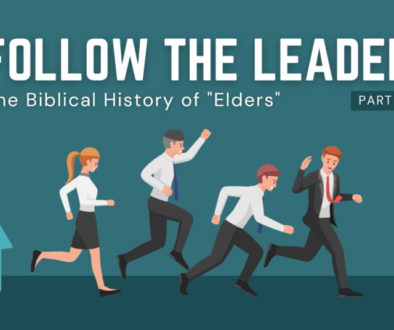(Click here for an Overview of the 4 Levels of Discipleship.)
Once a person has been won to Christ (Level 1), and has begun their walk in the foundational truths and practices of Christianity (Level 2), the third level of discipleship — and the longest-lasting — becomes paramount to their longevity in Christ. The believer must be taught not only to read the Bible as a matter of normal practice, but must also learn to interpret the meaning and apply it practically to their own life. This is what Paul calls, “the solid food” for believers, rather than “the milk of the word” (see Hebrews 5:12-14).
As I have shared in elsewhere, one of the most effective ways to teach a young believer to study the Word of God is called ‘The R.E.A.P. Method,’ which teaches you to Read, Examine, Apply, and Pray. In this post, however, I want to specifically look at some questions new believers should be taught to explore in every passage of scripture they read, which will help them to examine it and make a personal application. These questions can also be used as the basis for Bible-based group discipleship meetings, which will further help the new believers learn to ask them for themselves.
To Begin, Read the Passage
The obvious first step is to read the Bible. For deeper Bible study, the passage should not be too long. I would recommend a chapter at most, but more often than not, it should be a smaller section. A paragraph or even a single verse can be a good focus, especially in groups.
If you are doing a group discussion, it might be helpful to read the passage more than once. Allow the participants to summarize what the passage says, so that you can make sure they are grasping the story and context.
Question 1: “What does this teach us about God?”
The Bible is first and foremost God’s revelation of Himself to mankind. While scripture does give us important information about ourselves, that should not be the first focus of our study. Good theology is to understand the revealed truth about God!
If all scripture is primarily about Him, then we must understand what the passage we are reading says about Him first. Does it reveal a character trait, or speak about His love or His justice? Does it show us anything of His desires or His will? According to what we read, what do we learn about Him?
For private Bible study, a good practice to teach is to keep a journal and write these things down. Especially if something seems contradictory or confusing, then the people can bring the question up for discussion with a more mature believer or a church leader.
Question 2: “What does this teach us about people?”
Once we have established what the Bible teaches about Him, we then begin to explore our role in His story. As we look at what the Bible says about us, we must remember that there are two versions of us in scripture: the old man, who is lost without God, and the new man, who is redeemed and renewed in Jesus.
We are not yet asking application questions here, so it isn’t about taking action yet. First of all, we want to establish our identity according to scripture. Who does it say we were? Who does it say we are in Christ, now? What promises does the scripture make to us, and what conditions are those promises hinged upon?
Another avenue to explore is, how does what the scripture says about us compare with what it says about God? Are they the same, or is there a contrast being made?
Again, we should be teaching people to keep notes of these things, so that as God builds their knowledge through the Word, they will naturally begin to make connections and identify themes.
Question 3: “What does this teach that you should do?”
Once we have examined the things the scripture is teaching us, then it is time to turn our attention to the practical application of the Word. It is at this point we want to take note of any commands in our passage. Is there anything explicitly stated that believers should do or stop doing? Is there anything hinted at in the passage that would require our personal lifestyle or actions to change? Are there commands for the broader church, rather than just us as individuals? Once again, write them down.
Question 4: “How will you put this scripture into practice?”
Having established the commands of scripture, we now make it personal. We must look at our own lives as believers and analyze how we are measuring up to the teachings of the Bible. With the Holy Spirit’s help in prayer, we should see where we fall short, and turn our attention to repentance. In areas that are not sinful, but in which we must grow, we should ask ourselves how we can intentionally seek to develop in this area. Combined with listening to God in prayer, this exercise should not take too much effort to see where we need to grow and mature.
Once we have decided how we will pursue personal growth (and written them down), then I’d also recommend adding a timeframe to begin working on them. If it is a need to reach out to others, when will you make the time? If it is a need to stop doing something, then identify when that thing will come up and tempt you again, and ask the Holy Spirit to help you prepare to overcome.
If this is a group discussion that happens regularly, then encourage the participants to make an effort to apply these things before your next meeting, so that you can include a time for testimonies or follow-up discussion when you come together again.
Question 5: “Who do you know who needs to hear this message?”
This final question is one to encourage reaching out to others with the Gospel and God’s truth. It reminds us that we are part of a community of faith, and that no matter what God is teaching us in His word, there will be someone else who needs to hear it. We are called to give away what we have received from the Lord (see Matthew 10:8)
Encourage your disciples to think about someone else who needs this truth, and to make time with them to share what God has taught them. If it is a message of salvation, who do they know who needs to be saved. If it’s a word of encouragement, who do they know who would benefit from that message. When will you meet with them? Make it a priority!
This, again, will lead to a follow-up discussion at your next meeting if the question is asked as part of a group meeting.
This Becomes Self-Guided Discipleship
As the people you are discipling at this level learn to ask these questions, and make Bible study a regular part of their Christian walk, their maturity in Christ will begin to come automatically. Though we never outgrow the need for church fellowship and one-on-one accountability and mentoring, nothing can compare to a life committed to the scriptures for growth. Level 3 discipleship will help them to mature themselves in the Lord, and to have more to give away to others coming behind them in the faith.
(Click here for Level 4 Discipleship – From Learner to Leader.)
——————————————————————————
Note: These five questions did not originate with me, but I have found them beneficial enough that I want to share them with you! I originally learned them through a book called ‘Contagious Disciple Making: Leading Others on a Journey of Discovery.’ I cannot more highly recommend that book if you seek to develop your disciple-making skills and method. (If you use the Amazon links from this site, I get a kickback on your purchase, which enables me to continue my own disciple-making efforts in East Africa and beyond, so I am grateful if you do.)




